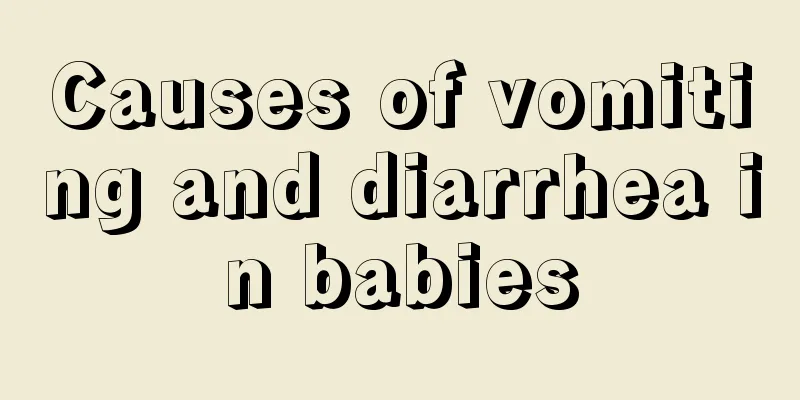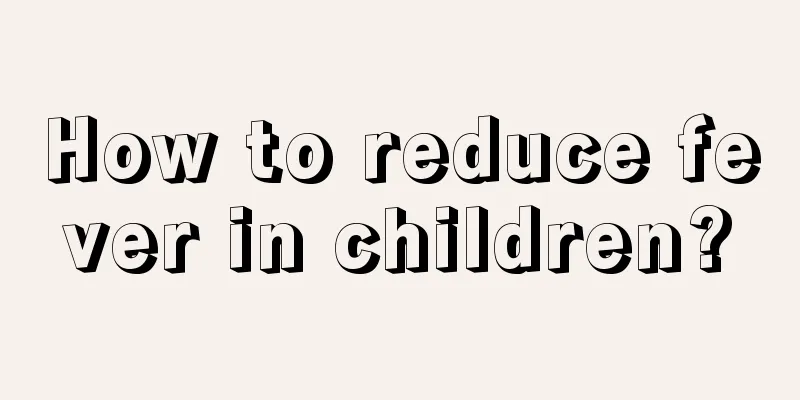Causes of vomiting and diarrhea in babies

|
Parents are very concerned about their baby's every move. Since the baby's organs are not yet fully developed, the baby's resistance and immunity are significantly lower than those of adults. Parents should help their babies prevent some common diseases. For example, if the baby has symptoms of vomiting and diarrhea, parents should understand the reasons why the baby has such symptoms. So what exactly causes the baby to have vomiting and diarrhea? 1. Gastroenteritis: It is one of the most common causes of diarrhea in children and can occur in infants, children and adults. Gastroenteritis can be caused by many different viruses. The most common pathogen is rotavirus. Half of the babies hospitalized for diarrhea are infected with this virus, which is more common in late autumn and early winter. If your baby has symptoms of vomiting and diarrhea, in addition to diarrhea, accompanied by stomach cramps, vomiting, low fever and other symptoms, it is likely caused by gastroenteritis. Babies have limited daily food intake and may lose a lot of water if they have diarrhea, so it is important to replenish your baby with water in a timely manner. 2. Bacterial infection: If a baby has severe diarrhea, accompanied by vomiting, abdominal pain, bloody stools, and fever, it is often caused by a viral or bacterial infection. Some of these infections can heal on their own, but others can be very serious. Therefore, if your baby has symptoms of vomiting and diarrhea, you should take your baby to see a doctor as soon as possible. The doctor will examine him and possibly do a stool culture to see if a bacterial infection is causing it. 3. Parasitic infection: Parasitic infection is also one of the causes of diarrhea in babies. For example, giardiasis is caused by a microscopic parasite that lives in the intestines. Parasites are easily spread when living in groups and require special medications to treat. Therefore, developing good hygiene habits, such as washing hands after changing diapers, is the best way to stop the spread of parasitic infections. 4. Antibiotics: Improper use of some antibiotics may cause intestinal flora imbalance and cause diarrhea in the baby. Therefore, if your baby develops diarrhea during or after treatment with antibiotics, it may be related to the medicine. Tell your doctor right away to see if you can switch to a different medication or treatment. 5. Food factors: Improper diet is a common cause of diarrhea in babies. Drinking too much fruit juice, especially juice containing sorbitol and high levels of fructose, or too many sugary drinks may also give your baby an upset tummy and loose stools. Therefore, your baby should eat less of these foods, and the condition will improve if he stops eating them for about a week. It is recommended not to give fruit juice to babies under 6 months old. After 6 months, the daily fruit juice intake should not exceed approximately 113 to 170 ml. Improperly prepared formula may also cause diarrhea in your baby, so add water in proportion when you prepare the formula. 6. Milk allergy: It is not uncommon for milk allergy to cause diarrhea, and sometimes it can cause vomiting in babies. If your baby is allergic to milk, he may show allergic symptoms within a few minutes to a few hours after drinking formula milk or eating dairy products, and may experience vomiting and diarrhea. In the above article, we introduced a common symptom in babies, that is, vomiting and diarrhea. We know that vomiting and diarrhea in babies may be related to bacterial infection, or may be related to milk allergy and parasitic infection. |
<<: One thing you must tell your children, you may not even know
>>: Reasons for baby's sweaty hands and feet
Recommend
What should I do if my baby has a high fever, diarrhea and vomiting?
My baby has had high fever, diarrhea and vomiting...
Treatment of baby's dry cough without phlegm
A baby's dry cough without sputum can cause s...
Baby's earwax is wet
In life, many of us parents don't like to obs...
What is the reason for a child's sudden excessive eye mucus?
Eye mucus is a common secretion in the corners of...
8 month old baby's daily milk intake
Babies grow very fast. In the blink of an eye, he...
What to do if your child always bites his lower lip
If a child often bites his lower lip, it is likel...
Is it normal for a newborn to dance while sleeping?
When a family has a cute baby, mom and dad will p...
What does hemolysis mean in children?
Hemolytic disease in a child refers to the incomp...
What is myocarditis in children?
Ever since we began to understand the heart, we k...
Reasons why babies cry suddenly when they are asleep
Nowadays, many parents do not know how to take ca...
What to do if your 10-month-old baby can't roll over
The baby will begin to grow slowly after birth, s...
Why is the child's urine yellow?
Some children have yellow urine, which will affec...
Symptoms of viral fever in children
It is very common to catch a cold and a fever whe...
Why do children's fingers itch?
It is said that the road of parenting is always f...
Reasons for a child's stomach rumbling
When a child's stomach growls, many parents a...









